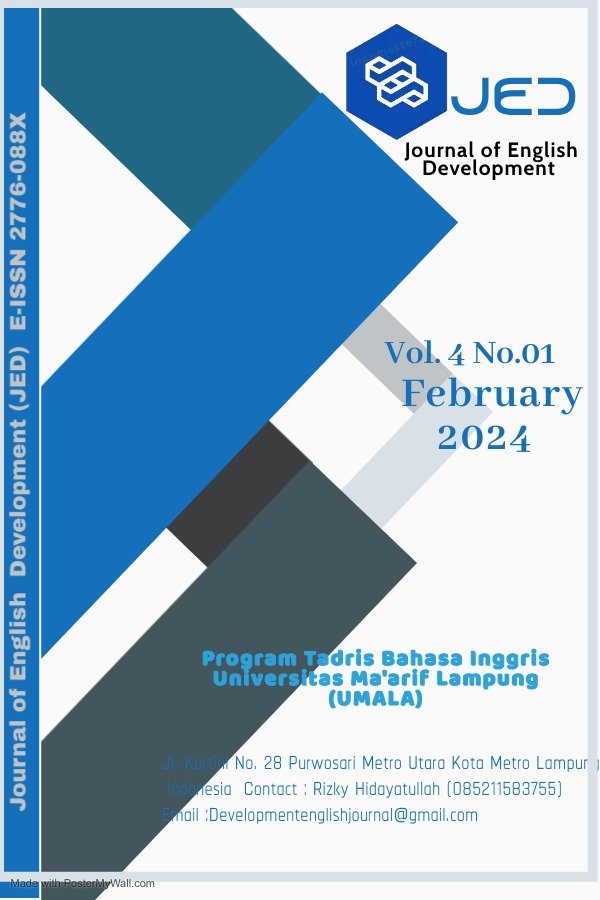The Developing a Guessing Game to Improve Speaking Skills for Grade 9th In Mts Al-Hidayah Sukonolo Bululawang
English
DOI:
https://doi.org/10.25217/jed.v4i01.4305Keywords:
guessing game, speaking skills, research and development (R&D)Abstract
The study aims to develop a guessing game in English to improve the speaking ability of grade 9 students at MTs Al-Hidayah Sukonolo. This product was developed as a fun learning media for students, so that students can enjoy speaking English, researchers took this product because according to the results of observations and suggestions from the subject teacher concerned. Students also lack confidence when speaking. They are afraid of making grammatical or pronunciation mistakes. The purpose of this study is to improve students. Ability to speak English, with this product students will be trained to be confident in pronouncing words in English based on research and development Borg and Gall. Qualitative data analysis procedure in form of data collection is done by means, of observation, reduction and categorization of data, data appearance a conclusion. Quantitative data analysis was carried out by collecting data from questioner assessment, the second questioner for the validator is material experts, media experts and response questioner given to teacher and students. seeing from questioner and research that has been done that this guessing game product has a score of 61-80% in the sense of good. So, it can be used easily and interestingly for pupils studying English, particularly with regard to their speaking abilities. At the development stage, researchers conducted validation to test the feasibility of the guessing game product. The validation was carried out by two specialists, namely media experts and learning experts. The validation score computation's findings indicate that the final average score, which is 91,07 with extremely valid. Based on the results of the questionnaire analysis that was filled in by students, the final average result was 75,00%. These results indicate the qualification of "WELL" according to the interval scale of 61% - 80%. So, guessing product can be categorized as interesting, useful, and easy-to used.
References
Aka, K. A. (2019). Integration Borg & Gall (1983) and Lee & Owen (2004) models as an alternative model of design-based research of interactive multimedia in elementary school. Journal of Physics: Conference Series, 1318(1), 012022.
Assyauqi, M. I. (n.d.). MODEL PENGEMBANGAN BORG AND GALL.
Daulay, I. K., & Asrul, N. (2021). The Effect of Media Guessing Game Towards University Students’ Writing Ability on Descriptive Text Local Tourism Content. English Review: Journal of English Education, 9(2), 389–398.
Dwijayani, N. M. (2019). Development of circle learning media to improve student learning outcomes. Journal of Physics: Conference Series, 1321(2), 022099.
Educational Technology Program, Universitas Sebelas Maret, Indonesia, muhammadhanif@student.uns.ac.id. (2019). Using Learning Media to Increase Learning Motivation in Elementary School. Anatolian Journal of Education, 4(2), 53–60.
Farianto, A., & Harmaini, F. (n.d.). TEACHING SPEAKING THROUGH THE GUESSING GAME.
Fisher, D., & Frey, N. (n.d.). Chapter 2. Using Oral Language to Check for Understanding.
Ganna, M. (n.d.). Teachers’ Strategies in Teaching Speaking (A Case Study Of An English Teacher In SMA Negeri 1 Toraja Utara).
Iqbal, Z. M., Saifudin, A., & Rofi, S. (2022). Developing Audio Media on Listening Skill Using Microsoft Sways and T2S Application for Junior High School. Journal of Development Research, 6(2).
Kramsch, C. (2014). Language and Culture. AILA Review, 27, 30–55.
Nuraen, N., & Karyati, K. (2018). The Implementation of Guessing Game in Teaching Speaking At Tenth Grade Of Senior High School. Project (Professional Journal of English Education), 1(5), 578.
Pantrisia Surtika Sari, Widiarini, Rofi’ah, S., & Makrifah, I. A. (2022). Developing of Android Based Educational Games as a Supplementary Media For Vocabulary of Junior High School Students. Journal of Development Research,
Taherdoost, H. (n.d.). Data Collection Methods and Tools for Research; A Step-by-Step Guide to Choose Data Collection Technique for Academic and Business Research Projects.
Wahyuni, S. (n.d.). THE USE OF GUESSING GAME TO IMPROVE STUDENT’S SPEAKING SKILL.
Zaim, M. (2017). Implementing Scientific Approach to Teach English at Senior High School in Indonesia. Asian Social Science, 13(2), 33.

Downloads
Published
How to Cite
Issue
Section
License
Copyright (c) 2024 Rizqi Yatul Layli, Siti Rofi’ah, Istina Atul Makrifah

This work is licensed under a Creative Commons Attribution-ShareAlike 4.0 International License.





